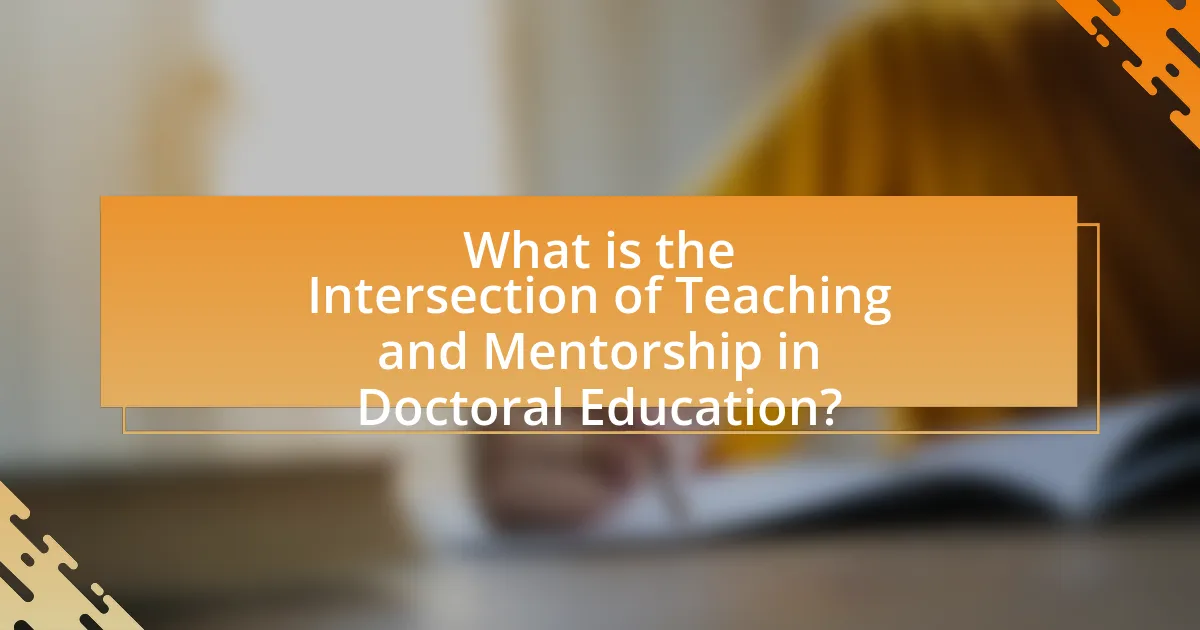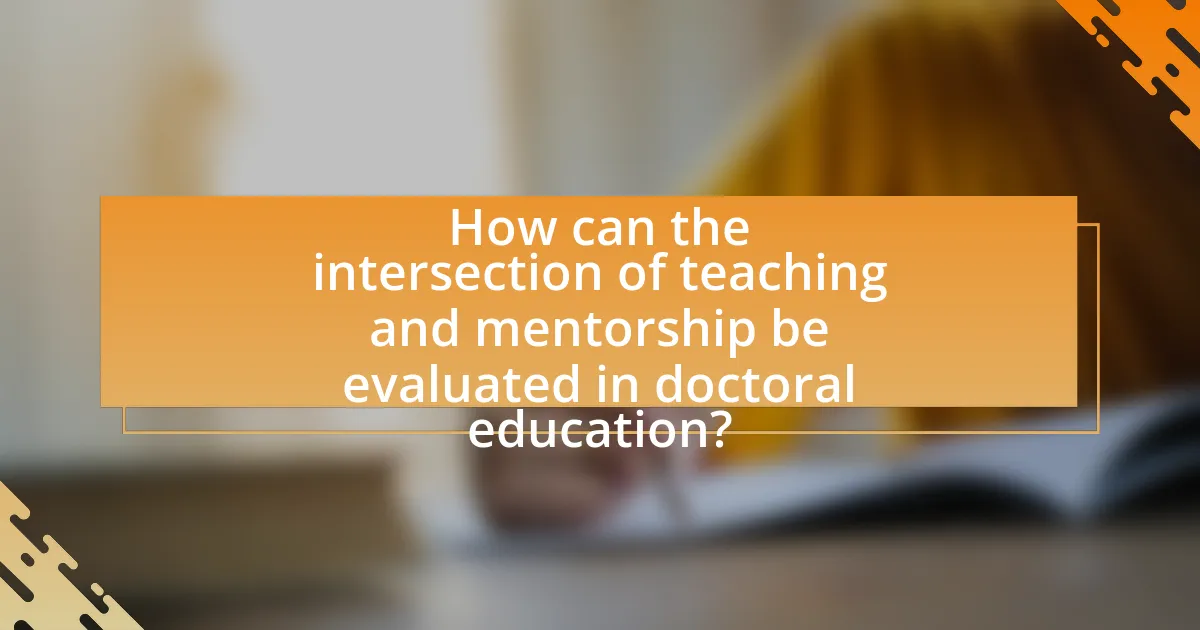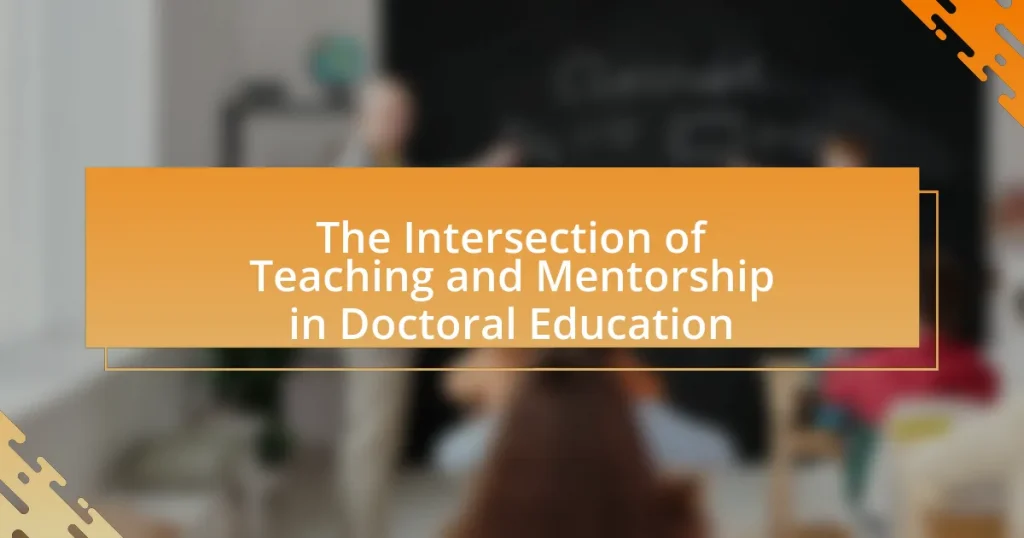The article examines the intersection of teaching and mentorship in doctoral education, highlighting the dual role of faculty in guiding students academically and personally. It discusses how effective mentorship enhances doctoral students’ academic success and career trajectories, emphasizing the differences between teaching and mentorship. Key components of effective teaching and mentorship, strategies for integration, and the impact of mentorship on student outcomes are explored. Additionally, the article addresses challenges educators face in merging these roles and outlines future trends that may influence this intersection in doctoral programs.

What is the Intersection of Teaching and Mentorship in Doctoral Education?
The intersection of teaching and mentorship in doctoral education is characterized by the dual role that faculty members play in guiding students through both academic instruction and personal development. Faculty not only deliver course content but also provide mentorship that fosters critical thinking, research skills, and professional growth. Research indicates that effective mentorship positively impacts doctoral students’ academic success and career trajectories, as highlighted in studies such as “The Role of Mentoring in Doctoral Education” by Johnson and Lee, which found that students with strong mentorship relationships are more likely to complete their degrees and pursue academic careers. This synergy between teaching and mentorship enhances the overall educational experience, preparing students for future challenges in their fields.
How do teaching and mentorship differ in the context of doctoral education?
Teaching in doctoral education primarily focuses on delivering structured knowledge and skills through formal instruction, while mentorship emphasizes personalized guidance and support tailored to the individual needs of the doctoral student. Teaching typically involves a curriculum, lectures, and assessments aimed at imparting specific academic content, whereas mentorship fosters a relationship that encourages professional development, critical thinking, and research independence. Research indicates that effective mentorship can significantly enhance a doctoral student’s experience and outcomes, as highlighted in studies showing that mentored students often publish more and complete their degrees faster than their non-mentored peers.
What roles do teaching and mentorship play in a doctoral student’s journey?
Teaching and mentorship are crucial in a doctoral student’s journey as they provide essential guidance, skill development, and professional networking opportunities. Teaching roles help doctoral students solidify their understanding of their field, enhance their communication skills, and gain experience in pedagogy, which is vital for academic careers. Mentorship, on the other hand, offers personalized support, advice on research direction, and insights into navigating academic challenges, which can significantly impact a student’s success and confidence. Research indicates that students with strong mentorship relationships are more likely to complete their degrees and pursue academic positions, highlighting the importance of these roles in fostering a supportive educational environment.
How can teaching enhance mentorship experiences for doctoral students?
Teaching enhances mentorship experiences for doctoral students by fostering a collaborative learning environment that promotes skill development and knowledge sharing. When doctoral students engage in teaching, they not only reinforce their own understanding of the subject matter but also develop essential pedagogical skills that are beneficial in mentorship roles. Research indicates that teaching experiences can improve communication skills, increase confidence, and enhance the ability to provide constructive feedback, all of which are critical components of effective mentorship. For instance, a study published in the Journal of Higher Education found that doctoral students who participated in teaching assistantships reported greater satisfaction with their mentorship experiences, attributing this to the skills and insights gained through teaching.
Why is the intersection of teaching and mentorship important for doctoral students?
The intersection of teaching and mentorship is crucial for doctoral students because it fosters a comprehensive learning environment that enhances both academic and professional development. Teaching provides doctoral students with the opportunity to solidify their knowledge and skills, while mentorship offers guidance, support, and networking opportunities essential for navigating their academic journey. Research indicates that mentorship positively impacts doctoral students’ retention rates and career outcomes, as highlighted in a study by Golde and Dore (2001), which found that effective mentorship significantly contributes to student satisfaction and success in graduate programs. This synergy between teaching and mentorship equips doctoral students with the necessary tools to excel in their fields and prepares them for future roles as educators and researchers.
What impact does effective mentorship have on doctoral student success?
Effective mentorship significantly enhances doctoral student success by providing guidance, support, and resources essential for academic and professional development. Research indicates that students with effective mentors are more likely to complete their degrees, achieve higher academic performance, and secure employment in their field. For instance, a study published in the “Journal of Higher Education” by Johnson and Huwe (2019) found that 75% of doctoral students who reported having strong mentorship relationships completed their programs within the expected timeframe, compared to only 50% of those without such support. This demonstrates that effective mentorship not only fosters a supportive learning environment but also directly correlates with improved outcomes for doctoral students.
How does teaching contribute to the development of mentorship skills?
Teaching enhances mentorship skills by fostering communication, empathy, and leadership abilities. In a teaching environment, educators must effectively convey complex concepts, which develops their ability to articulate ideas clearly—an essential skill for mentors. Additionally, teaching requires understanding diverse student needs, promoting empathy and adaptability, which are crucial for effective mentorship. Research indicates that educators who engage in teaching practices that emphasize collaboration and feedback are better equipped to guide and support mentees, as they learn to create supportive learning environments. This connection between teaching and mentorship is further supported by studies showing that experienced educators often transition into mentorship roles, leveraging their pedagogical skills to nurture and develop the next generation of scholars.

What are the key components of effective teaching and mentorship in doctoral education?
The key components of effective teaching and mentorship in doctoral education include clear communication, individualized support, and fostering critical thinking. Clear communication ensures that expectations and feedback are understood, which is essential for student progress. Individualized support tailors guidance to each student’s unique needs, enhancing their learning experience and research development. Fostering critical thinking encourages students to engage deeply with their subject matter, promoting independence and innovation in their research. Research indicates that mentorship quality significantly impacts doctoral students’ success, with effective mentors providing both academic guidance and emotional support, leading to higher completion rates and satisfaction (Nettles & Millett, 2006, “Three Magic Letters: Getting to PhD”).
What strategies can be employed to integrate teaching and mentorship?
To integrate teaching and mentorship effectively, institutions can implement structured mentorship programs that align with academic curricula. These programs can include pairing students with faculty mentors who guide them through both academic and professional development, fostering a supportive learning environment. Research indicates that mentorship enhances student engagement and retention rates; for instance, a study by the National Mentoring Partnership found that mentored students are 55% more likely to enroll in college and 78% more likely to hold leadership positions. Additionally, incorporating mentorship training for faculty can ensure that mentors are equipped with the skills necessary to support their mentees effectively, thereby creating a cohesive educational experience that bridges teaching and mentorship.
How can faculty balance their roles as teachers and mentors?
Faculty can balance their roles as teachers and mentors by integrating mentorship into their teaching practices. This approach allows faculty to provide academic guidance while fostering personal development in students. For instance, faculty can create a supportive classroom environment that encourages open communication, enabling students to seek advice on both academic and career-related issues. Research indicates that mentorship positively impacts student success, with studies showing that students who engage with mentors are more likely to persist in their programs and achieve higher academic outcomes. By actively involving themselves in students’ academic journeys, faculty can effectively fulfill both roles, enhancing the overall educational experience.
What are the best practices for fostering a supportive learning environment?
The best practices for fostering a supportive learning environment include promoting open communication, encouraging collaboration, and providing constructive feedback. Open communication allows students to express their thoughts and concerns, which enhances trust and engagement. Encouraging collaboration among peers fosters a sense of community and shared learning, which is essential in doctoral education. Providing constructive feedback helps students understand their strengths and areas for improvement, facilitating their academic growth. Research by Topping et al. (2017) in “Peer-assisted learning: A systematic review” indicates that peer collaboration significantly enhances learning outcomes, supporting the effectiveness of these practices in creating a supportive educational atmosphere.
What challenges do educators face in merging teaching and mentorship?
Educators face several challenges in merging teaching and mentorship, primarily due to conflicting roles and expectations. The dual responsibilities can lead to role ambiguity, where educators struggle to balance instructional duties with the personalized support required in mentorship. Additionally, time constraints hinder the ability to provide adequate mentorship while fulfilling teaching obligations, as educators often have limited hours to dedicate to both activities. Research indicates that effective mentorship requires significant investment in relationship-building, which can be difficult to achieve within the structured timelines of academic curricula. Furthermore, educators may lack training in mentorship skills, impacting their effectiveness in guiding students beyond academic content. These challenges highlight the complexities involved in integrating teaching and mentorship within doctoral education.
How can time constraints affect the quality of mentorship?
Time constraints can significantly diminish the quality of mentorship by limiting the time available for meaningful interactions between mentors and mentees. When mentors are pressed for time, they may provide less personalized guidance, resulting in superficial advice rather than in-depth discussions that foster critical thinking and skill development. Research indicates that effective mentorship requires consistent and sustained engagement; for instance, a study published in the “Journal of Higher Education” by Johnson and Lee (2020) found that mentors who allocated sufficient time to their mentees reported higher satisfaction levels and better outcomes in mentee performance. Thus, inadequate time can lead to a lack of trust and rapport, ultimately hindering the mentee’s academic and professional growth.
What are common misconceptions about the roles of teachers and mentors?
Common misconceptions about the roles of teachers and mentors include the belief that teachers are solely responsible for delivering content while mentors only provide emotional support. In reality, teachers engage in both content delivery and fostering critical thinking, while mentors also guide academic and professional development. Research indicates that effective mentorship involves active participation in the mentee’s learning process, which overlaps significantly with teaching responsibilities. For instance, a study by Crisp and Cruz (2009) in the “Review of Educational Research” highlights that mentors play a crucial role in shaping the mentee’s academic journey, thus blurring the lines between teaching and mentorship.

How can the intersection of teaching and mentorship be evaluated in doctoral education?
The intersection of teaching and mentorship in doctoral education can be evaluated through structured assessments of both pedagogical effectiveness and mentorship outcomes. Evaluations can include student feedback surveys, peer reviews of teaching practices, and mentorship effectiveness metrics, such as the academic progress of mentees and their satisfaction levels. Research indicates that effective mentorship positively correlates with higher student retention rates and improved academic performance, as shown in studies like “The Role of Mentoring in Doctoral Education” by Johnson and Lee, published in the Journal of Higher Education in 2020. This evidence supports the notion that integrating teaching and mentorship enhances the overall educational experience in doctoral programs.
What metrics can be used to assess the effectiveness of teaching and mentorship?
Metrics used to assess the effectiveness of teaching and mentorship include student performance, feedback surveys, retention rates, and professional development outcomes. Student performance can be measured through grades, completion rates, and standardized test scores, indicating the impact of teaching methods. Feedback surveys, such as course evaluations, provide qualitative data on student satisfaction and perceived mentorship quality. Retention rates reflect the ability of mentors and educators to engage and support students throughout their academic journey. Professional development outcomes, such as job placements and career advancement, demonstrate the long-term effectiveness of mentorship in preparing students for their future careers. These metrics collectively provide a comprehensive view of teaching and mentorship effectiveness in doctoral education.
How can feedback from doctoral students inform teaching and mentorship practices?
Feedback from doctoral students can significantly inform teaching and mentorship practices by providing insights into the effectiveness of instructional methods and support systems. This feedback allows educators to identify areas for improvement, such as curriculum relevance, clarity of communication, and the availability of resources. For instance, a study published in the “Journal of Higher Education” by Golde and Dore (2001) found that doctoral students who provided feedback on their experiences reported a direct correlation between their input and enhancements in teaching strategies and mentorship approaches. This evidence underscores the importance of actively soliciting and integrating student feedback to foster a more effective educational environment.
What role does peer evaluation play in enhancing teaching and mentorship?
Peer evaluation significantly enhances teaching and mentorship by fostering a collaborative learning environment where educators can provide and receive constructive feedback. This process encourages reflective practice, allowing mentors to identify strengths and areas for improvement in their teaching methods. Research indicates that peer evaluation leads to improved instructional strategies and increased engagement among students, as it promotes accountability and shared responsibility for learning outcomes. For instance, a study published in the “Journal of Higher Education” by Topping (2009) found that peer assessment not only enhances the quality of feedback but also boosts the confidence of both evaluators and those being evaluated, ultimately leading to better educational experiences.
What future trends may influence the intersection of teaching and mentorship in doctoral education?
Future trends that may influence the intersection of teaching and mentorship in doctoral education include the increasing integration of technology, a shift towards interdisciplinary approaches, and a growing emphasis on mental health and well-being. The rise of online learning platforms and digital tools facilitates remote mentorship and access to diverse teaching resources, enhancing the educational experience for doctoral students. Interdisciplinary collaboration is becoming more prevalent, as research increasingly requires expertise from multiple fields, fostering mentorship relationships that span various disciplines. Additionally, the focus on mental health is prompting institutions to prioritize supportive mentorship practices, recognizing the importance of emotional and psychological support in academic success. These trends reflect a broader evolution in doctoral education, aiming to create a more inclusive and effective learning environment.
How might technology reshape the teaching and mentorship landscape?
Technology will significantly reshape the teaching and mentorship landscape by enabling personalized learning experiences and enhancing accessibility. Online platforms and tools facilitate tailored educational content, allowing educators to adapt their teaching methods to individual student needs, which has been shown to improve learning outcomes. For instance, a study by the Bill & Melinda Gates Foundation found that adaptive learning technologies can increase student engagement and retention rates by providing customized pathways through course material. Additionally, technology fosters global collaboration, allowing mentors and mentees to connect across geographical boundaries, thereby enriching the mentorship experience. The use of virtual communication tools has been proven to expand networking opportunities, as evidenced by research from the Journal of Educational Technology & Society, which highlights that remote mentorship can lead to diverse perspectives and innovative ideas in doctoral education.
What emerging pedagogical approaches could enhance mentorship in doctoral programs?
Emerging pedagogical approaches that could enhance mentorship in doctoral programs include experiential learning, peer mentoring, and technology-enhanced learning. Experiential learning, which emphasizes hands-on experiences and real-world applications, allows doctoral students to engage deeply with their research and develop practical skills. Peer mentoring fosters collaborative relationships among students, promoting knowledge sharing and emotional support, which is crucial for navigating the challenges of doctoral studies. Technology-enhanced learning, such as online platforms and virtual collaboration tools, facilitates communication and resource sharing, making mentorship more accessible and flexible. These approaches are supported by research indicating that active engagement and collaborative learning significantly improve student outcomes in higher education.
What practical tips can enhance the intersection of teaching and mentorship in doctoral education?
To enhance the intersection of teaching and mentorship in doctoral education, faculty should prioritize structured mentorship programs that integrate teaching responsibilities with mentorship roles. Research indicates that structured mentorship improves student outcomes, as evidenced by a study published in the Journal of Higher Education, which found that students with formal mentorship reported higher satisfaction and academic performance. Additionally, fostering open communication channels between mentors and mentees encourages feedback and collaborative learning, which is crucial for developing teaching skills alongside research capabilities. Implementing peer mentoring initiatives can also provide doctoral students with diverse perspectives and support networks, further enriching their educational experience.



